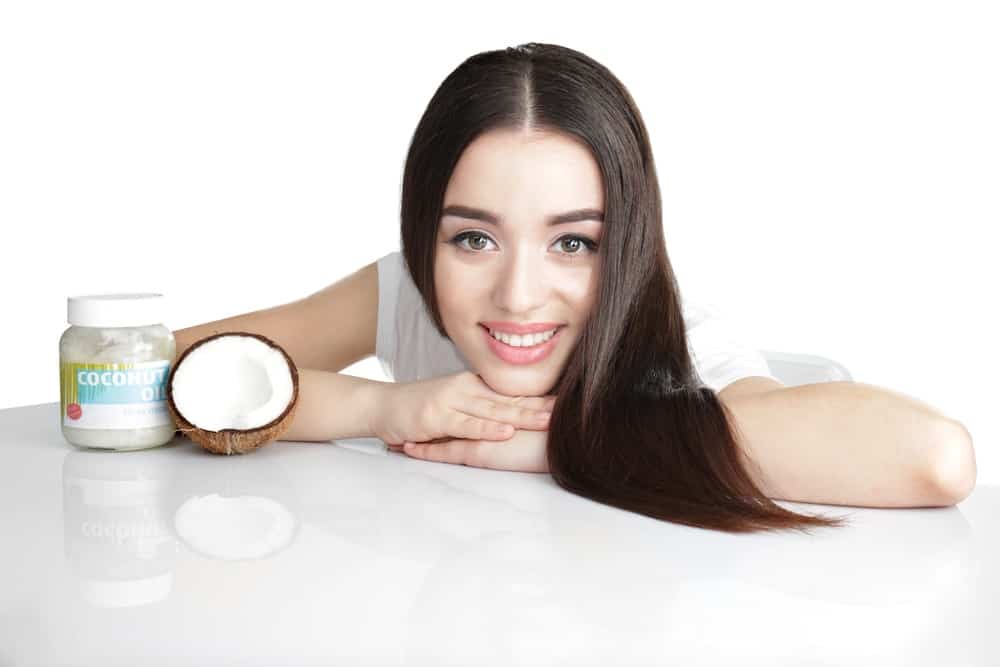Coconut oil is one of the multitasking oils in the game—it can nourish your hair, grow out your brows, soothe your dry skin, whiten your teeth, and soften your cracked lips.
Considering the number of benefits, can coconut oil be used before coloring your hair, or it will only affect your hair dye? Coloring your hair is one of the stylish ways to revamp your look, so you have to make sure your hair is healthy in between color jobs.
Coconut oil can even prevent protein loss in your hair. That’s the reason why you should apply coconut oil before coloring your hair since bleach strips off your natural hair oil leaving your strands vulnerable to damage.
Since coconut oil takes time to get absorbed, it is better to use it at night on your dry hair, before coloring it the next morning. If you’re new to the coconut bleaching method, read our guide before coloring your hair.
Step-by-Step Guide on Using Coconut Oil Before Coloring Your Hair
Make sure your hair is clean.
To make your hair color last, you should start with clean, healthy hair. Experts recommend washing your hair with a low sulfate shampoo that won’t be drying and harsh to your scalp. Yes, you should do damage control before coloring your hair.
All you need to do is to remove any product buildup to your hair, so you’ll have even hair color. You may skip the conditioner this time since you’ll use coconut oil to replace the moisture.
Prep your hair with coconut oil at night before bleaching and hair coloring.
Check this Coconut Oil on Amazon
The coconut oil takes time to get absorbed in your hair that is why the coconut bleaching method is done at night on dry hair. Most of the time, you need to warm the coconut oil before applying it to your hair.
When you warm the coconut oil, it will be easier to rub it in your hair and get absorbed. If you can, heat three to seven tablespoons of coconut oil, depending on your hair length, and apply it to your hair from root to tip before going to bed.
You can use a shower cap to cover your hair, so the coconut oil will be absorbed in your strands. When the coconut oil you used is warm, it can also open the hair cuticles, allowing deeper absorption.
If you’re suffering from dry and damaged hair, massaging an ample amount of coconut oil will strengthen your strands and hydrate your scalp.
Just part your hair into manageable sections, and apply coconut oil evenly. If you have thin, fine hair, use an ample amount of coconut oil since it can weigh your hair down.
Remember, bleaching will add more damage to your strands, making it brittle and weak, so you have to apply coconut oil to the driest part of your strands.
Dye your hair, as usual, the next day with coconut oil still on your hair.
Bleaching your hair is the only way to get a lighter hair color if you’re a brunette or a woman with a darker hair color since the chemical helps your hair dye to get absorbed in your strands.
Unfortunately, hair bleaches and dyes contain peroxides, copper, iron, and ammonia that will damage your hair. A great thing, coconut oil will prevent these harsh chemicals from penetrating your strands, leaving lesser damage.
You should bleach your hair the next day without rinsing out the coconut oil. Don’t fret as the coconut oil won’t affect the bleach and hair dye.
When you’re done with the bleaching and hair coloring process, you can rinse your hair with water and shampoo, but skip those clarifying shampoos, sulfates, and paraben loaded hair products.
Coconut oil also makes it easier for you to part your hair during bleaching or coloring. More than that, coconut oil helps to make your hair color sleeker when it is completely done. In fact, it will help to make your hair dye natural-looking while leaving your hair soft and healthy.
Wash and condition your hair as usual—but add coconut oil into the mix.
After you have bleached and colored your hair, it won’t be going to look as healthy as before. So, you should give it some time to heal and have a hair care regimen to keep it strong and healthy.
Do you know that your hair is more vulnerable and prone to damage when wet? A week after coloring your hair, you may apply coconut oil before washing it. This way, you’ll lessen the hair damage caused by frequent shampooing, brushing, and hairstyling.
You may even use coconut oil as your hair mask that will nourish your scalp and makes your strands softer.
In fact, coconut oil can be your all-rounder hair product—conditioner, scalp treatment, hair mask, hair oil, pre-wash and post-wash protector. The key is to know how much oil you need, depending on your hair type and hair length.
Will Coconut Oil Affect Hair Dye?
A great thing, coconut oil has no stripping element or acidic ingredient into it, so it won’t affect your hair dye.
Some experts recommended skipping washing your hair for a few days before beaching and hair coloring, and it is because to allow your scalp to produce natural oils.
To keep your hair healthier, use coconut oil as a treatment after coloring your hair, as it can help to make your dye last longer.
What Are the Benefits of Coconut Oil to Your Hair?
It nourishes the scalp and hydrates dry hair.
Do you know that most oils only coats your hair and never gets absorbed into your hair shaft? Sunflower oil and mineral oil might leave your hair softer and smoother, but they cannot penetrate deeply like coconut oil.
If you think water hydrates your hair, think again as your hair is more vulnerable when wet. A great thing, coconut oil repels water, so it is best to apply the oil before washing your hair.
More than that, coconut oil has antimicrobial properties that can help to treat dandruff on the scalp. You might be a big fan of clarifying shampoos that leave your hair squeaky clean, but they actually harm your hair.
Most of them are oil stripping and loaded of harmful chemicals, which only leads to dry scalp and frizzy hair.
It prevents chemical damage.
Since coconut oil deeply penetrates your hair, it can prevent harmful chemicals, air pollution, and even UV rays from damaging your hair.
Apart from using the oil prior to coloring and bleaching your hair, you can also use it before you take a plunge in a chlorinated pool. If you usually use a heat protectant or UV hair protection for your hair, think of coconut oil.
Studies have found that coconut oil has as an SPF of 8, which can be beneficial for your hair.
It makes your hair healthy, and frizz-free.
Do you know that your hair tends to look frizzy when it is exposed to water, along with harsh chemicals, leaving your strands with little oil? Coconut oil has hydrophobic properties that can prevent tangled hair and frizz.
If your hair is dry and damaged, coconut oil can serve as a leave-in conditioner to make your strands look smooth and shiny. In fact, coconut oil is the perfect substitute for silicone-based hair products that can give the same shine and bounce to your hair.
It aids with hair loss.
If you’re dealing with thinning hair, coconut oil can be your best friend. You can massage coconut oil into your scalp and leave it as an overnight hair mask, or even use it as a pre-wash and post-wash hair product.
Keep in mind that there are lots of things that cause hair loss—poor diet, malnutrition, iron deficiency, hormonal imbalance, thyroid diseases, and certain medications.
Apart from having a great hair care regimen, you should also treat your condition with a balanced diet and a healthy lifestyle.
To get the most out of this miracle oil, you should make coconut oil a regular part of your hair care routine.
Related Questions:
How does coconut oil help to prevent protein loss in your hair?
According to studies, coconut oil is rich in fatty acids and has a high affinity for hair proteins. More than that, coconut oil has a low molecular weight, making it easier to penetrate your strands.
Do you know that studies state that coconut oil reduced protein loss in chemically treated hair, bleached hair, and even UV exposed hair?
Compared to sunflower oil and mineral oil that can only coat the hair, coconut oil is made up of lauric acid that can be absorbed well into the hair shaft.
Does coconut oil aid with hair growth?
At this point, there is no research linking coconut oil to faster hair growth, but it is said that it helps to hydrate your scalp and strengthen your strands.
Hair breakage like split ends and brittle strands are some of the conditions that coconut oil prevents, making your hair stronger and healthier.




Rina
Thursday 7th of October 2021
If i do not have coconut oil ,can i use coconut milk instead of coconut oil before hair coloring ?
Irina Tracy
Thursday 11th of November 2021
hi, Rina! Sure, you can use coconut milk instead of coconut oil but it will not be as concentrated. If you are going to use coconut milk, choose one that is high in fat rather than the light version because you need the nutrients. And you will also have to use more coconut milk than you would use coconut oil. Thank you for reaching out! Good luck!
Prema
Saturday 22nd of May 2021
A day before applying the colour- do you wash and apply the coconut oil to dry or wet hair ?
My specific hair colour requires you to wet ( not wash) before application - will this lessen the effect of the oil.
Thanks
Irina Tracy
Thursday 27th of May 2021
Hello, Prema! You can apply the coconut oil on both wet and dry hair. However, on wet hair it will be absorbed faster in the strands and nourish your hair better. Either way, it shouldn't affect your coloring process. But make sure to not put coconut oil in your hair too thick. You want to add just a thin layer that will be absorbed fast. Hope this helped!
Patty
Monday 8th of June 2020
Thank you for the information about Coconut oil & hair coloring! Very useful. I will try it.